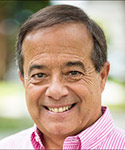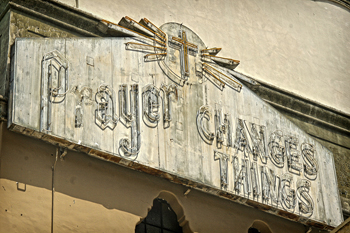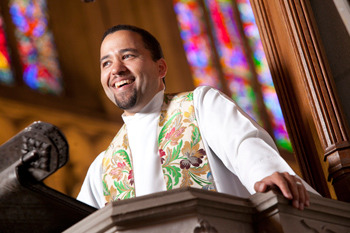Editor’s note: Faith & Leadership offers sermons that shed light on issues of Christian leadership. This sermon was preached Aug. 27, 2008, in Duke Divinity School’s Goodson Chapel.
Laceye Warner will be a featured lecturer during Renewing the Church, Duke Divinity School's 2013 Convocation & Pastors' School, Oct. 14-15. Register online.
What is one of the most important practices to Christian life and discipleship? Prayer.
Martin Luther King, Jr., [said] “to be a Christian without prayer is no more possible than to be alive without breathing.” Prayer has sustained us, shaped us, formed us and led us to this point. God, in Christ through the Holy Spirit, is connected to us in relationship through prayer.
But, how and what we pray reveals a significant amount about our relationship to God and others. For some, prayer is about bringing our list of needs -- a.k.a. wants -- to God. As has been attributed to C.S. Lewis, “prayer is not for the purpose of changing God, but rather for changing us.” Prayer brings us closer to God and one another, a means of restoring the image of God in us. In the text read today, the key activity of the two characters, a Pharisee and a tax collector, is prayer.
The Pharisee, standing by himself, prayed: “God, I thank you that I am not like other people: thieves, rogues, adulterers, or even like this tax collector. I fast twice a week; I give a tenth of my income.” Was his prayer answered? Yes. What did the Pharisee ask of God? Nothing. Upon whom did the Pharisee rely for his identity and salvation? Himself. Who sustained the Pharisee in his life and vocation? Himself. So, then, what was his purpose in going to the Temple and uttering his reflections to God? Whatever his purpose, it did not seem to include an openness to being formed in God’s image in relationship to God and neighbor.
“But the tax collector, standing far off, would not even look up to heaven, but was beating his breast and saying, ‘God, be merciful to me, a sinner!’” Was the tax collector’s prayer answered? Yes. And for what did he pray? Mercy. The tax collector petitioned God for mercy. While aware of his sinfulness, the tax collector understood or at least hoped for understanding of the vastness of God’s mercy and came humbly to the Temple to seek God’s grace. Did he think he could save himself on his own strength or good works? No. He saw the possibility of drawing closer to God.
Note that the Pharisee and the tax collector pray at a distance from one another, in part because of the politics of the community, in part perhaps because of their perception of self. The Pharisee prays standing by himself in a section worthy of his role but, perhaps, also because of his contempt for others. The tax collector prays standing far off, again in a space considered deserving of his role, but also possibly because of contempt for himself.
Whether we distance ourselves from God and one another because of an abundance of self, or whether we are distanced from God and God’s creation because of lack of self, our telos, our purpose, is proximity to and relationship with God, neighbors and creation.
You have arrived at Duke Divinity School sustained by the Holy Spirit in submission to God’s call upon your lives to serve Jesus Christ. Looking back, whether in the first week of your first semester, or the first week of your last, the path journeyed is a significant one deserving many prayers of thanksgiving.
But the journey has just begun. There will be many legs to this journey and only relationship to God and others can give the endurance and sustenance needed. Like the Pharisee, we can be tempted into self-sufficiency (that’s Pelagianism), forgetting that this is a journey with God and neighbor in which we are invited to share in the revealing of God’s reign. Or with the tax collector, we can separate ourselves or allow others to separate us from community. But what redeems us is allowing God in Christ through the Holy Spirit to draw us into relationship with God and neighbor.
It is no small accomplishment that you are here at Duke Divinity School, whether student, faculty, administrator or staff. But even in this beautiful place surrounded by Christian architecture and art, texts and practices, we too can regard others or ourselves with contempt and allow ourselves to believe we have accomplished or will accomplish our work here and in the church and the world on our own strength.
It is interesting that the Pharisee pursued the very practices -- fasting, tithing, prayer -- that cultivate relationship with God through Jesus Christ, yet he did not allow the Holy Spirit through these practices to form his identity and bring him into a closer relationship with God. Wherever we are on our journey, it is God’s love for all creation -- and our responding to that love -- that sustains our vocation, identity and purpose.
While one could manage to leave this place having collected a vast amount of knowledge about God through the content of core classes, advanced seminars and even dutiful field education without the Christian practices of love of God and neighbor, that content will eventually lose its meaning. Practices of prayer, worship, silence, rest, devotion and outreach -- some in the curriculum, but most beyond -- will sustain our vocation in God’s reign over a lifetime when pursued in relationship to God and one another. (The Pharisee most likely had a vast amount of knowledge, but his journey to the Temple and prayer had little purpose in relation to God.)
Helmut Thielicke in his “A Little Exercise for Young Theologians” cautions students of theology to watch for the increasing tendency to shift from the second person -- talking to God -- to the third person -- talking about God. The study of theology loses something profound when it is not done in the context of prayer and a community seeking to practice Christian faith.
When we are open to the Holy Spirit’s formation of us through Christian practices of love of God, neighbor and creation, rather than self-promotion, we are drawn into God’s reign.
At the same time, we are located -- intentionally -- in a university setting where knowledge of God and intellectual practices are valued.
Simone Weil reminds us that academic work can be sacramental when pursued with the telos of the love of God and through tasks that heighten our attentiveness to that which is other than ourselves. Without this rigorous attention, according to Weil, we can neither pray nor be present with those who suffer. When we cultivate practices of rigorous attention to texts, we are also given the opportunity to cultivate practices of rigorous attention to God, neighbor and creation -- intellectual practices that are infinitely applicable to “real” ministry.
It is God that has brought us here and gathered us to learn from one another gaining in knowledge about God, not to prove our worth but to heighten our attentiveness in relationship to God and neighbor.
God has called us to a variety of ministries -- some of preaching, some of teaching, as well as advocating. Be faithful in prayer, for God will make the way plain. The assignments, grades and evaluations that are exchanged cannot undermine God’s call upon our lives. For God’s reign is not realized merely through these means. God’s reign is realized through the prayers of the humble as we grow together in knowledge of God, receiving God’s mercy in Jesus Christ, serving one’s neighbor in the strength of the Holy Spirit and sharing God’s love and mercy with the world.




















